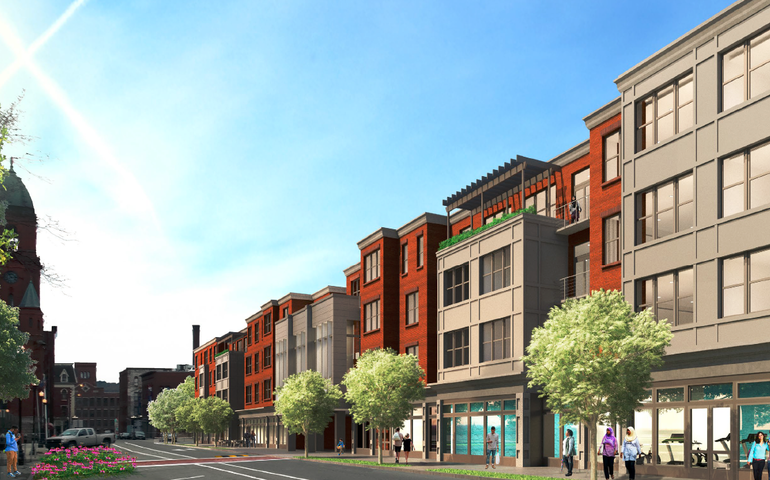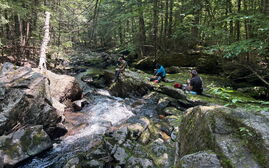
$30M grant expected to bring dramatic change to Lewiston neighborhood
 Courtesy / City of Lewiston
A rendering shows rehabbed housing planned in downtown Lewiston with support from the $30 million Choice Neighborhoods Implementation Grant.
Courtesy / City of Lewiston
A rendering shows rehabbed housing planned in downtown Lewiston with support from the $30 million Choice Neighborhoods Implementation Grant.
Lewiston beat out four large U.S. cities for a $30 million national grant that is expected to fund dramatic change in one of the state's poorest and most challenged neighborhoods.
The city announced Thursday that it has been awarded the Choice Neighborhoods Implementation Grant through the U.S. Department of Housing and Urban Development, which will pay for improvements in housing, education, health care and the landscape of the 28-block Tree Streets neighborhood.
Other finalists for the grant were Detroit, Cleveland, Camden, N.J., and Fort Myers, Fla.
The money is designed to transform neighborhoods that are dealing with distressed housing, inadequate schools, poor health, high crime and lack of capital.
The executive summary of the grant application was clear on the neighborhood's challenges and how the plan funded by the grant can change things: "[The plan] proposes a 25-year strategy to grow the Tree Streets neighborhood from that place in Maine with the highest concentration of childhood lead poisoning and families in poverty, the worst perceptions of crime and racial tension, and the state’s lowest performing schools into a lead-free, economically diverse, and ethnically and socially welcoming community."
At the core of the funding's focus is a plan for 185 units of energy-efficient, safe housing, replacing some that is more than a century old. The housing plan and other improvements the money will fund are outlined in the 250-page Growing Our Tree Streets plan approved by the City Council in 2019.
HUD requires 70% of the money go to housing; 15% to caring for people, including things like health care access and food security; and 15% to neighborhood beautification.
"This is not just about housing, it's about the need to build opportunity," Economic Development Director Lincoln Jeffers told Mainebiz in March, when the city was named a finalist.
The 28-block target area has three of the state's six "extreme poverty tracts," as designated by the U.S. Census bureau. Nearly all families in the area "subsist at extremely low poverty levels with no clear pathways out," the grant application said. Participation in quality early learning programs is nearly nonexistent, and education outcomes through high school "are exceptionally low." Healthy food and positive lifestyle options are largely unavailable and the ones that are are underused.
"There are opportunities for individual and family success in the economic and service landscape of Lewiston, but these are often confounding and arduous to access for those just struggling to meet basic daily needs," the application says. "Self-sufficiency may be attainable, but going it alone is baffling and exhausting. "
The plan's strategy responds to those needs, calling for one-on-one support for residents, and assessment of needs, greater investment in service programs, as well as adding new ones and reserving $1.2 million for mentoring through the end of the decade. The plan also focuses on increasing energy, schooling and health and wellness options, as well as making the neighborhood greener and more pedestrian-friendly.
Jeffers said in March that the grants usually go to larger cities, and the fact Lewiston was named a finalist is a reflection of years of hard work by those involved.
The city got a $1.3 million planning grant from the program in 2018 and another $75,000 from MaineHousing in November to finish the grant application. The grant was awarded to Lewiston Housing Authority and city of Lewiston, in partnership with Community Concepts. The Gorman Foundation also has supported the project, including funding a consultant who helped write the grant application.
Jeffers said the residents of the neighborhood were the real force behind the effort.
"We're fortunate to have had hundreds of citizens engaged in this," he said. "It's not about City Hall saying 'here's how to fix your neighborhood,' it's about the citizens envisioning what kind of neighborhood they want to have."

Grant will replace aging housing
Specific plans for housing include replacing 92 "severely distressed" public and assisted housing units and also has a plan for "and the systematic, block-by-block replacement of the century-old, obsolete, lead-poisoned tenements that now dominate the Tree Streets housing market," the plan summary says.
The team behind the grant application has assembled 18 parcels of vacant land and structures in three neighborhood gateway locations to be used for replacement housing. Plans are for 185 new multifamily units: 92 replacement, 38 workforce to be built using low income housing tax credits and 55 unrestricted.
The sites targeted by the grant represent 100% of the family housing downtown controlled by the Lewiston Housing Authority. Two-thirds were built between 1880 and 1920 as wood-frame mill-worker tenements, and all are severely distressed, according to the grant application. Specifically targeted are:
- Maple Knoll, a 39-unit complex with 31 HUD-assisted apartments. Originally constructed as two separate four-story walk-ups in the 1890s, the structures were combined in a 1970s renovation.
- Lafayette Park, a 30-unit public housing development with one to three-bedroom units in five two-story buildings constructed in 1982 on a 2.5-acre lot.
- Tree Streets scattered sites, 21 public housing units in six buildings in the neighborhood between Maple Knoll and Lafayette Park. All were built between the 1880 and 1920 and rehabbed for low-income housing in 1985.
The city's Facebook page Thursday night said the state's congressional delegation was instrumental in the city getting the grant, with U.S. Sen. Susan Collins, R-Maine, "leading the charge." Collins, U.S. Sen. Angus King, I-Maine, and U.S. Rep. Jared Golden, D-Maine 2nd District, issued news releases Thursday night congratulating the city on the grant.
Collins said that, as the ranking member of the Housing Appropriations Committee, she championed the grant application and spoke directly with HUD leaders about it.
"This funding will be truly transformational for the entire city as well as its citizens and will help Lewiston achieve its vision to revitalize its downtown,” she said. “By taking a holistic approach to housing, people and community, this project will redevelop the Tree Streets neighborhood and provide residents with new educational and career resources to help families break cycles of poverty."
Gov. Janet Mills also issued a statement, saying that she visited Lewiston earlier this week, walking the Tree Street neighborhood with Mayor Mark Cayor and city economic development and housing staff.
"They told me about how hard the city and its people have been working to revitalize the neighborhood and ensure that all who call it home have a bright future defined by good schools, safe housing, and economic opportunity," she said. "With this transformative federal funding in hand, and with their hard work and ingenuity, that future is on the horizon."














0 Comments